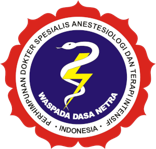Pain Management with Ganglion Impar Block in Adenocarcinoma Recti
Abstract
Case Illustration: A 60-year-old female patient was admitted with complaints of pain around the anus. The patient has been diagnosed with Adenocarcinoma recti two years ago. Pain is felt like being stabbed and persists in the anal area. Pain intensity increases on sitting and defecation. The patient has undergone chemotherapy 12 times and is taking pain relievers that have been prescribed regularly. The patient's Numeric Rating Scale (NRS) score is 6-7, which is categorized as severe pain. This patient underwent ganglion impar block using the trans sacrococcygeal joint approach with the help of fluoroscopy to relieve the severe pain.
Conclusion: Ganglion Impar Block (GIB) can be performed with significant results in reducing opioid use and reducing pain in patients with Adenocarcinoma recti. The technique of administering neurolysis agents with the help of fluoroscopy can be an option because it is very effective and simpleKeywords
Full Text:
PDFReferences
1. Astaras C, Bornand A, Koessler T. Squamous rectal carcinoma: a rare malignancy, literature review and management recommendations. ESMO Open. 2021;6:100180. doi:10.1016/j.esmoop.2021.100180
2. Bray F, Ferlay J, Soerjomataram I, Siegel RL, Torre LA, Jemal A. Global cancer statistics 2018: GLOBOCAN estimates of incidence and mortality worldwide for 36 cancers in 185 countries. CA Cancer J Clin. 2018;68(6):394-424. doi:https://doi.org/10.3322/caac.21492
3. Sayuti M, Nouva N. KANKER KOLOREKTAL. AVERROUS J Kedokt dan Kesehat Malikussaleh. 2019;5:76. doi:10.29103/averrous.v5i2.2082
4. WHO. WHO Guidelines for the Pharmacological and Radiotherapeutic Management of Cancer Pain in Adults and Adolescents.; 2018.
5. Laksono R. Transsacrococcygeal neurolytic block of ganglion impar in vulvar carcinoma: a case report. Anaesthesia, Pain Intensive Care. 2018;22:98-100.
6. Jain PN. Interventional Management for Cancer Pain. Indian J Pain. 2021;35(1). https://journals.lww.com/ijpn/fulltext/2021/35010/interventional_management_for_cancer_pain.3.aspx
7. Ji R-R, Nackley A, Huh Y, Terrando N, Maixner W. Neuroinflammation and Central Sensitization in Chronic and Widespread Pain. Anesthesiology. 2018;129(2):343-366. doi:10.1097/ALN.0000000000002130
8. Sencan S, Kenis-Coskun O, Demir FGU, Cuce I, Ercalık T, Gunduz OH. Ganglion Impar block improves neuropathic pain in coccygodynia: A preliminary report. Neurol Neurochir Pol. 2018;52(5):612-617. doi:https://doi.org/10.1016/j.pjnns.2018.08.006
9. Swain BP, Vidhya S, Kumar S. Ganglion Impar Block: A Magic Bullet to Fix Idiopathic Coccygodynia. Cureus. 2023;15(1):e33911. doi:10.7759/cureus.33911
10. Pradipta EJBH, Prajoko YW, Wahyudi F. GAMBARAN PASIEN KARSINOMA KOLOREKTAL DI RSUP DR. KARIADI SEMARANG YANG MENGALAMIN OBESITAS, HIPERTENSI, DAN HIPERGLIKEMIA. 2017;6(2):480-486.
11. Thrumurthy SG, Thrumurthy SSD, Gilbert CE, Ross P, Haji A. Colorectal adenocarcinoma: risks, prevention and diagnosis. BMJ. 2016;354:i3590. doi:10.1136/bmj.i3590
12. Sasaki S, Sugiyama M, Nakaji Y, et al. Anal metastasis of rectal cancer—adenocarcinoma of squamous cells: a case report and literature review. Surg Case Reports. 2017;3(1):55. doi:10.1186/s40792-017-0319-x
13. Muthusami S, Ramachandran KI, Babu NK, et al. Role of Inflammation in the Development of Colorectal Cancer. Endocrine, Metab Immune Disord - Drug Targets. 2021;21(1):77-90. doi:http://dx.doi.org/10.2174/1871530320666200909092908
14. Chin M, Fenska JE, Anitescu M. Sympathetic Blocks: Ganglion Impar Block and Neurolysis BT - Anesthesiology In-Training Exam Review: Regional Anesthesia and Chronic Pain. In: Banik RK, ed. Springer International Publishing; 2022:293-297. doi:10.1007/978-3-030-87266-3_56
15. Hong DG, Hwang S-M, Park J-M. Efficacy of ganglion impar block on vulvodynia: Case series and results of mid- and long-term follow-up. Medicine (Baltimore). 2021;100:e26799. doi:10.1097/MD.0000000000026799
16. Sousa Correia J, Silva M, Castro C, Miranda L, Agrelo A. The efficacy of the ganglion impar block in perineal and pelvic cancer pain. Support Care Cancer. 2019;27(11):4327-4330. doi:10.1007/s00520-019-04738-9
17. Okçu M, Şencan S, Gündüz OH. Rare complication of ganglion impar blockade with the transsacrococcygeal approach: A case of rectal perforation. Turkish J Phys Med Rehabil. 2023;69(1):121-124. doi:10.5606/tftrd.2022.8874
18. Choudhary Kishor; Kumar, Dhirendra; Nagaraju, Venishetty; Verma, Shilp RK. Alívio da dor após bloqueio do gânglio ímpar e ablação por radiofrequência em pacientes com coccigodínia: Uma revisão sistemática TT - Improvement in Pain Following Ganglion Impar Blocks and Radiofrequency Ablation in Coccygodynia Patients: A Systematic Review. Rev Bras Ortop (Sao Paulo). 2021;56(05):558-566. doi:10.1055/s-0041-1735829
Refbacks
- There are currently no refbacks.








